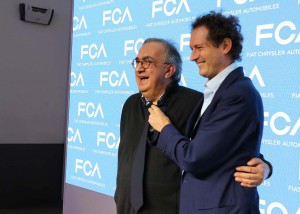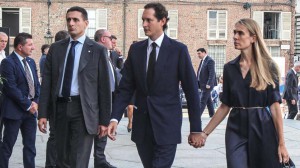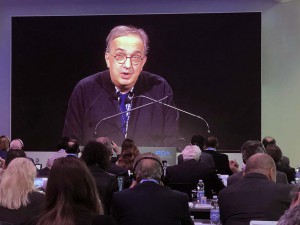An overflow crowd filled the Turin Cathedral on Friday morning marking the first of two planned memorials for Sergio Marchionne, the CEO of Fiat Chrysler Automobiles who died unexpectedly at the age of 66 nearly two months ago.
The ceremony brought out a mix of political and industrial elites, including FCA Chairman John Elkann and two former Italian prime ministers, as well as company workers and many local residents, according to Italian news reports.
“Never take a break or a deep breath because life doesn’t stop,” said Elkann, the heir to the founders of the Fiat side of FCA, recalling Marchionne’s always-on-the-go work ethic.
“What struck me about you, Sergio, from the beginning, were your human qualities, your generosity and your way of understanding others,” Elkann said, as he delivered an emotional farewell to his colleague and personal friend, his voice repeatedly cracking. “For me you were someone I could talk to, someone I could trust, but above all, a friend. You taught us all to think differently. To have the courage to do and to change. To not be afraid. Go in peace, dear friend.”
(Former FCA CEO Sergio Marchionne dead at 66. Click Here for the story.)
Born in Italy, raised in Canada and ultimately a businessman who could call many countries home, Marchionne is seen by many as the rare executive who could claim to have saved two companies. He is credited with turning around a struggling Fiat which, in turn, came in as the white knight to salvage Chrysler as it emerged from bankruptcy in 2010. It was only after Fiat agreed to partner with the Detroit automaker that then-President Barack Obama agreed to provide a desperately needed federal bailout.
In June, Marchionne outlined his latest five-year strategy for the now-merged Fiat Chrysler Automobiles, though he was expected to stick around only long enough to put the plan in gear, with his retirement expected to come in spring 2019. But the executive known for always wearing a rumpled black sweater never made it that far.
In early July, the automaker announced that the chief executive would take several weeks off to recuperate from shoulder surgery. Then, on the 21st, came the announcement that Marchionne had taken a turn for the worse and was being replaced as CEO by Mike Manley, the head of the Jeep and Ram brands who had been seen as Marchionne’s most likely successor. Four days later, Marchionne was gone.
(Marchionne had been secretly treated for a health problem for over a year. Click Here for more.)
It subsequently was revealed that the executive had a more serious ailment not revealed even to his most senior FCA colleagues. While official information has not been released, several sources have told TheDetroitBureau.com that a sarcoma was discovered in Marchionne’s shoulder a year earlier. It is an often-deadly disease that developed in his bones and spread to the connective tissue. During what was seen as risky surgery at a Swiss hospital Marchionne suffered a stroke and irreversible brain damage. He was put on life support but never emerged from his coma.

John Elkann holds up the tie Marchionne briefly wore during the presentation of his five-year plan before switching back to his familiar black sweater.
One source said Marchionne had been well aware of the risks going into the surgery but chose to chance it anyway.
It was in line with the way he did business, calculating risk and never hesitating to move when he saw the opportunity during 14 years with Fiat and Chrysler. While there were plenty of challenges left for FCA to deal with, Marchionne was able to crow about achieving one of his biggest goals during the June 4 strategy session in Milan, paying off the last of the company’s industrial debt. But he also noted that FCA will be spending big going forward, with the new five-year plan outlining more than $52 billion in capital expenditures.
(FCA reports lower than expected earnings as it mourns Marchionne. Click Here for the report.)
During Friday’s memorial, Turin’s Archbishop Cesare Nosiglia praised Marchionne’s “courage and open-minded intelligence,” and said the executive “taught us we must not fear new things.”
Attended by an estimated 2,000 people, Friday’s ceremony at the Turin Cathedral was a decidedly democratic event, with elites in black suits joined by FCA workers wearing their assembly line jumpsuits. After his death, many of the workers had left messages and flowers on the door of Marchionne’s Italian home in Crocetta, near Fiat’s spiritual home in Turin.
Under Marchionne, the merged company was legally registered in the Netherlands, with its official headquarters in London. But it continued to maintain functional headquarters in both Italy and the U.S.
A second memorial service will be held in the Detroit suburb of Auburn Hills, where the U.S. operations are based, on September 27th.


